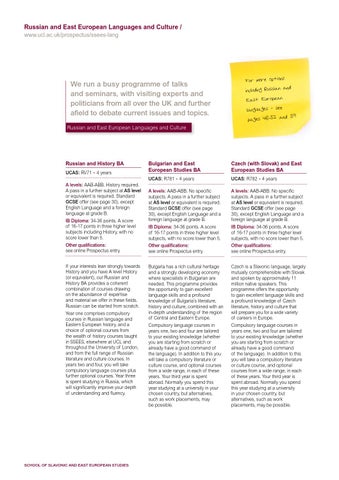Russian and East European Languages and Culture / www.ucl.ac.uk/prospectus/ssees-lang
We run a busy programme of talks and seminars, with visiting experts and politicians from all over the UK and further afield to debate current issues and topics.
For more options including Russian and East European languages - see pages 48‑52 and 59
Russian and East European Languages and Culture
Russian and History BA
Bulgarian and East European Studies BA
Czech (with Slovak) and East European Studies BA
UCAS: R781 • 4 years
UCAS: R782 • 4 years
A levels: AAB-ABB. No specific subjects. A pass in a further subject at AS level or equivalent is required. Standard GCSE offer (see page 30), except English Language and a foreign language at grade B.
A levels: AAB-ABB. No specific subjects. A pass in a further subject at AS level or equivalent is required. Standard GCSE offer (see page 30), except English Language and a foreign language at grade B.
IB Diploma: 34-36 points. A score of 16-17 points in three higher level subjects, with no score lower than 5.
IB Diploma: 34-36 points. A score of 16-17 points in three higher level subjects, with no score lower than 5.
Other qualifications: see online Prospectus entry.
Other qualifications: see online Prospectus entry.
Other qualifications: see online Prospectus entry.
If your interests lean strongly towards History and you have A level History (or equivalent), our Russian and History BA provides a coherent combination of courses drawing on the abundance of expertise and material we offer in these fields. Russian can be started from scratch.
Bulgaria has a rich cultural heritage and a strongly developing economy where specialists in Bulgarian are needed. This programme provides the opportunity to gain excellent language skills and a profound knowledge of Bulgaria’s literature, history and culture, combined with an in-depth understanding of the region of Central and Eastern Europe.
Czech is a Slavonic language, largely mutually comprehensible with Slovak and spoken by approximately 11 million native speakers. This programme offers the opportunity to gain excellent language skills and a profound knowledge of Czech literature, history and culture that will prepare you for a wide variety of careers in Europe.
Compulsory language courses in years one, two and four are tailored to your existing knowledge (whether you are starting from scratch or already have a good command of the language). In addition to this you will take a compulsory literature or culture course, and optional courses from a wide range, in each of these years. Your third year is spent abroad. Normally you spend this year studying at a university in your chosen country, but alternatives, such as work placements, may be possible.
Compulsory language courses in years one, two and four are tailored to your existing knowledge (whether you are starting from scratch or already have a good command of the language). In addition to this you will take a compulsory literature or culture course, and optional courses from a wide range, in each of these years. Your third year is spent abroad. Normally you spend this year studying at a university in your chosen country, but alternatives, such as work placements, may be possible.
UCAS: RV71 • 4 years A levels: AAB-ABB. History required. A pass in a further subject at AS level or equivalent is required. Standard GCSE offer (see page 30), except English Language and a foreign language at grade B. IB Diploma: 34-36 points. A score of 16-17 points in three higher level subjects including History, with no score lower than 5.
Year one comprises compulsory courses in Russian language and Eastern European history, and a choice of optional courses from the wealth of history courses taught in SSEES, elsewhere at UCL and throughout the University of London, and from the full range of Russian literature and culture courses. In years two and four, you will take compulsory language courses plus further optional courses. Year three is spent studying in Russia, which will significantly improve your depth of understanding and fluency.
SCHOOL OF SLAVONIC AND EAST EUROPEAN STUDIES
